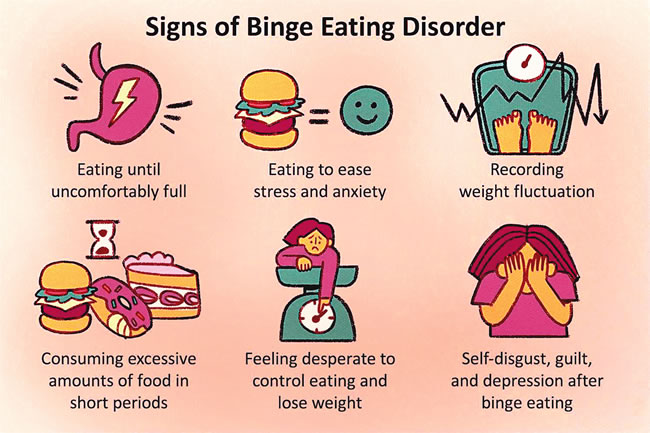[ad_1]
Overeating or what is popularly called binge-eating disorder is a serious condition that many fail to recognise as an issue. It is a situation whereby an individual consumes unusually large amounts of food and feel unable to stop eating.
While almost everyone overeats on occasion, especially during festive periods or during the holidays that people may occasionally have seconds or thirds of a holiday meal.
However, for some people, excessive overeating that is out of control is a regular occurrence that crosses the line to binge-eating disorder. And people that are affected by binge-eating disorder, even in embarrassing situations, cannot help themselves or do anything to stop the compulsion
Symptoms of binge eating includes being overweight or obese though some may maintain normal weight. There are however behavioural and emotional symptoms associated with binge-eating; eating unusually large amounts of food in a specific amount of time usually short period intervals, feeling that your eating behavior is out of control, eating rapidly during episodes, eating even when you›re full or not hungry and uncomfortably full, constant eating alone or in secret, filled with feelings of depression disgust, shame and guilt and dieting without weight loss among others.
The severity of binge-eating disorder is determined by how often episodes of occur during a week and it is important to see a doctor immediately one suspects a case of binge eating before it reaches a crisis situation.
The causes of binge-eating disorder are unknown. But genetics, biological factors, long-term dieting and psychological issues are said to increase risk.
Binge-eating disorder is more common in women than in men and often begins in the late teens or early 20s.
Factors like family history, dieting, depression and psychological issues can increase risk of developing binge-eating disorder.
Complications that may be caused by binge-eating disorder include poor quality of life, problems functioning at work, obesity, social isolation, joint problems, heart disease, type 2 diabetes, gastroesophageal reflux disease (GERD) and some sleep-related breathing disorders among other health hazards and disorders like depression, anxiety, bipolar disorder and substance use disorders
If you think a friend or loved one has a binge-eating problem, steer her or him toward healthier behavior and professional treatment before the situation worsens. If you have a child:
ALSO READ FROM NIGERIAN TRIBUNE
[ad_2]
Source link



